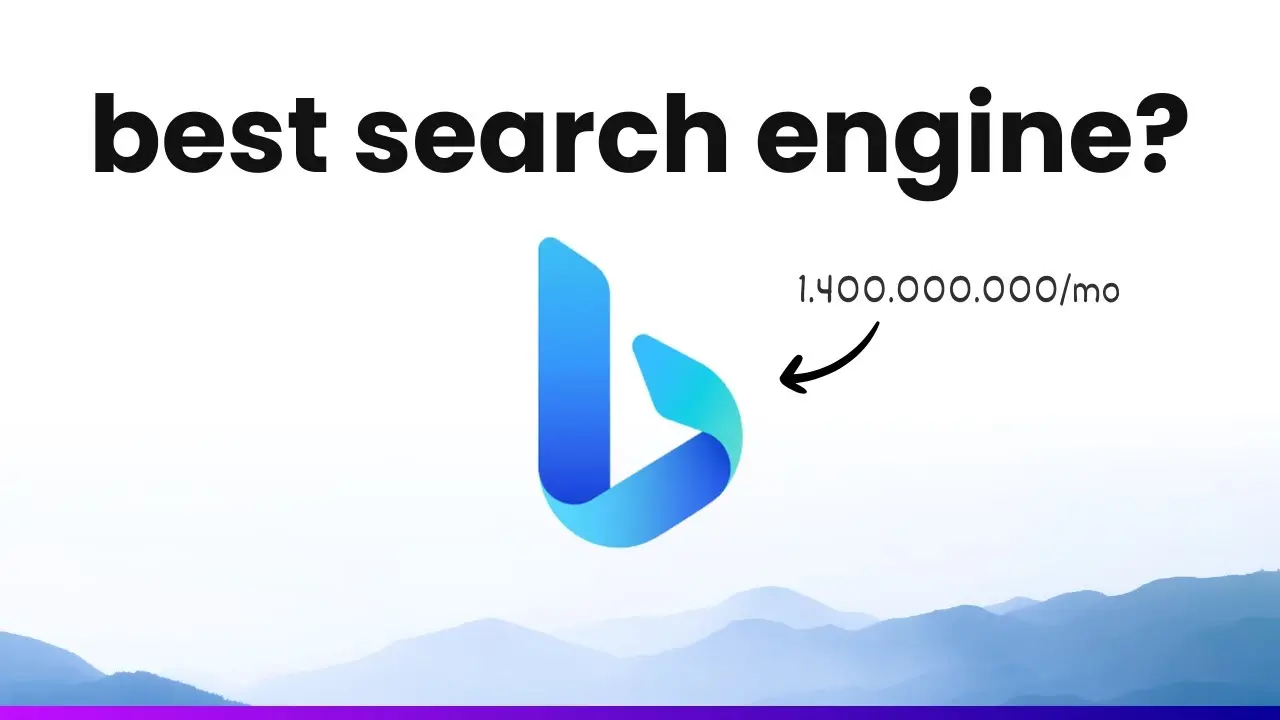- Bing offers significant traffic potential with over 1.3 billion monthly visits
- Optimizing for Bing can lead to better rankings on other search engines like DuckDuckGo and Yahoo
- Key differences in ranking factors between Google and Bing can be leveraged for better results
As an SEO professional, I’ve often encountered skepticism when discussing the importance of ranking on Bing. Many dismiss it as a waste of effort, citing Google’s dominance in the search engine market. However, I’ve discovered that optimizing for Bing can yield surprising benefits, and it’s not as challenging as you might think. Let me share my insights on why and how you should focus on ranking your website on Bing.
First, let’s address the elephant in the room: Why bother with Bing when Google is the undisputed king of search? Well, I’ve found that many of my websites rank well on Bing without much additional effort. Interestingly, these pages often struggle to gain traction on Google, despite my keyword research being Google-centric. This unexpected success on Bing has opened my eyes to its potential.
The Surprising Reach of Bing
Bing isn’t as small as you might think. With over 1.3 billion monthly visits, it outperforms popular platforms like LinkedIn, Pinterest, and Quora. To put this into perspective, consider how many businesses generate significant traffic from these sites. If they can do it, why not tap into Bing’s substantial user base?
Moreover, Bing’s index powers several other search engines, including DuckDuckGo, Yahoo, and Ecosia. This means that ranking well on Bing can potentially improve your visibility across multiple platforms. It’s like killing several birds with one stone.
The rise of AI-powered tools like ChatGPT, Meta AI, and Copilot has further expanded Bing’s reach. These AI assistants often use Bing as their primary search engine, displaying links and websites in their results. This integration adds billions more potential impressions to Bing’s already impressive numbers.
Optimizing Your Website for Bing
Now that we’ve established why Bing matters, let’s dive into how you can optimize your website to rank well on this platform. The good news is that many core SEO principles apply to both Google and Bing, but there are some key differences to keep in mind.
1. Focus on Technical SEO
Just like with Google, a solid technical foundation is crucial for ranking on Bing. This includes:
- Ensuring your site is mobile-friendly
- Implementing HTTPS for secure browsing
- Creating high-quality, original content
- Building a strong backlink profile
While these factors are important for both search engines, Bing places a slightly different emphasis on some elements.
2. Leverage Bing Webmaster Tools
One of the first steps in optimizing for Bing is to submit your website to Bing Webmaster Tools. This platform is similar to Google Search Console but offers some unique features that I find particularly helpful.
For instance, Bing Webmaster Tools provides more transparent insights into your website’s weaknesses. It might suggest getting more backlinks or improving specific areas of your site. This level of clarity is something I wish Google would emulate.
3. Implement IndexNow
IndexNow is a protocol developed by Bing, Yandex, and other search engines to improve crawling efficiency. By implementing IndexNow, you can ensure that search engines only crawl your site when you add or update content, reducing server load and improving indexing speed.
You can easily add IndexNow to your WordPress site using plugins like “Index Now SEO” or by activating the feature in SEO plugins like RankMath. Unfortunately, Yoast SEO locks this feature behind a premium subscription, which is disappointing given that IndexNow is an open protocol.
Key Differences Between Bing and Google
While there are many similarities in SEO best practices for both search engines, understanding the differences can give you an edge when optimizing for Bing.
1. Keyword Interpretation
Google has become increasingly sophisticated in interpreting search intent, often going beyond the literal meaning of keywords. Bing, on the other hand, tends to be more literal in its interpretation.
For example, if you have an article titled “Best Electric Bicycles for Commuting in 2024,” it’s more likely to rank well on Bing for that exact phrase. This makes keyword optimization somewhat easier on Bing compared to Google’s more context-driven approach.
2. Desktop vs. Mobile Priority
While Google adopted mobile-first indexing in 2016, Bing still prioritizes desktop experiences. This makes sense given Bing’s close association with Microsoft Edge and Windows. However, it’s still crucial to ensure your site is optimized for both desktop and mobile users.
3. Social Signals
Bing places more importance on social signals than Google does. Factors like the number of followers, engagement rates, and likes can significantly impact your rankings on Bing. If your business has an active and engaged social media presence, you’re already ahead of the game on Bing.
Leveraging Recent Insights
The recent leak of Google’s algorithm details has provided valuable insights that can be applied to Bing optimization as well. While the specifics may differ, understanding the core principles behind Google’s ranking factors can help you create a more robust SEO strategy for both search engines.
In conclusion, optimizing for Bing isn’t just about tapping into a secondary market – it’s about diversifying your traffic sources and potentially uncovering opportunities that you might miss by focusing solely on Google. By understanding the unique aspects of Bing’s algorithm and implementing best practices, you can improve your overall search visibility and drive more traffic to your website.
Remember, the digital landscape is constantly evolving. Staying informed about changes in search algorithms and adapting your strategy accordingly is key to maintaining and improving your rankings across all search engines. So, don’t neglect Bing – it might just be the secret weapon in your SEO arsenal.






